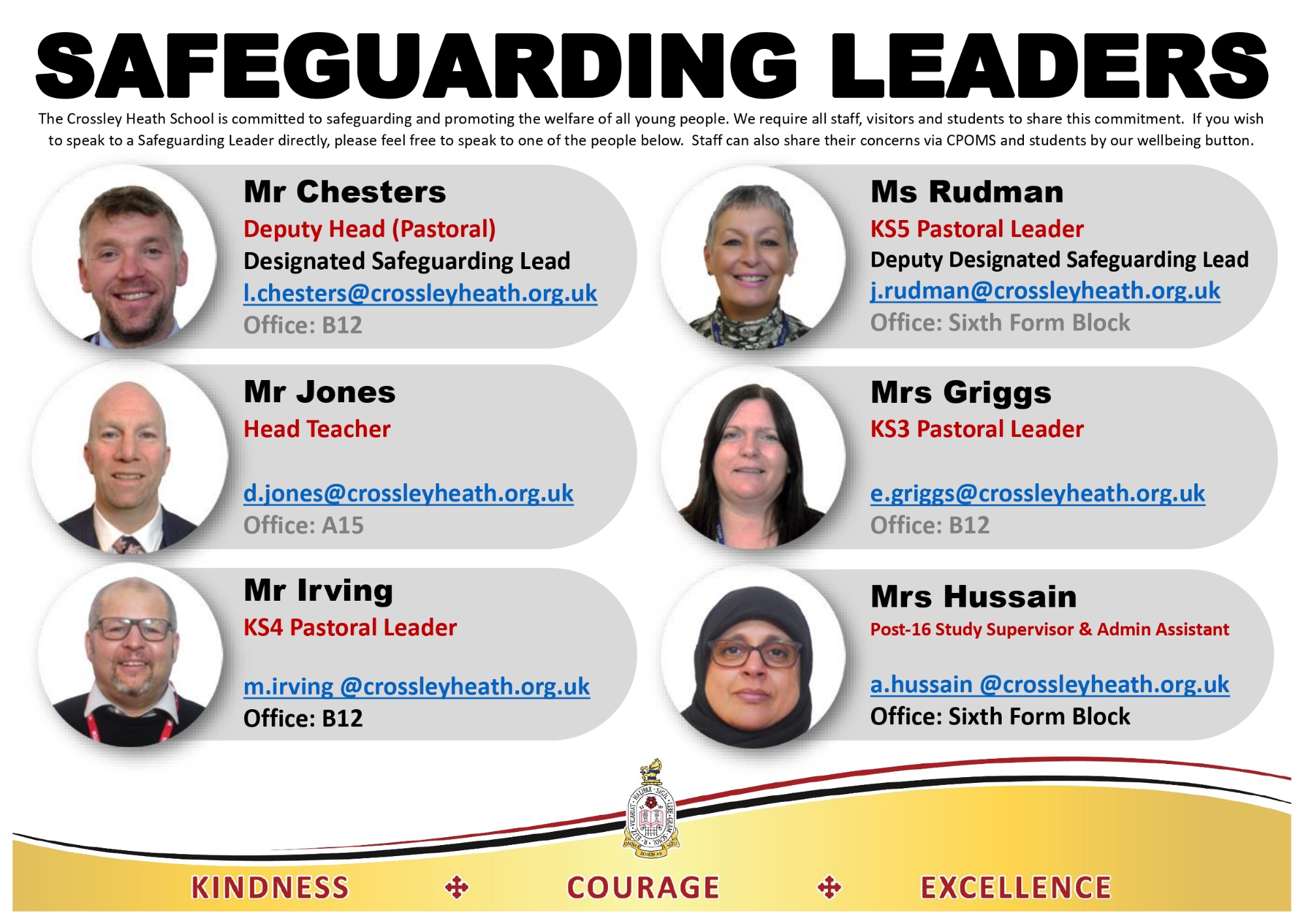Safeguarding
At The Crossley Heath School we adopt a whole school approach to safeguarding and this is achieved through our policies and processes in order to operate with the best interests of the child at heart. We encourage all staff to use their professional curiosity and to always be critical with what they see and hear. The school follows guidance and protocols outlined by Calderdale’s Safeguarding Board. Our school is a safe space for all students.
The school takes a zero-tolerance approach to all reported incidents of Child on Child abuse, sexual violence and/or sexual harassment and we never accept behaviour as ‘just banter’ or ‘boys being boys’ for example. We do not accept derogatory language and although we are academically selective, we are culturally inclusive. Our school value of ‘Respect’ is central to our approach. Child on Child abuse can be defined as any form of physical, sexual, emotional and financial abuse, and coercive control, exercised between children and within children’s relationships (both intimate and non-intimate). Online child on child abuse is any form of child on child abuse with a digital element, for example, sexting, online abuse, coercion and exploitation, peer-on-peer grooming, threatening language delivered via online means, distribution of sexualised content and harassment. Further guidance on Youth Produced Sexual Imagery can be found here
All adults in school are trusted adults and we ensure that staff receive regular training to keep them updated on safeguarding developments. We have high aspirations in that all members of the pastoral team are regularly attending additional training courses to further increase their knowledge and expertise to support our pupils and the intention is for all pastoral team members to be trained to the level of Designated Safeguarding Lead.

We have a robust procedure which staff use to raise safeguarding concerns and we foster positive working relationships with parents and carers to ensure pupils receive the appropriate support as soon as they need it.
We heavily invest in listening to the views of all of our pupils, they have a true voice in our school. Student’s can report concerns via ‘are you worried about something’ button on our website or in person to a trusted member of staff.
To further support the pastoral needs of our pupils we also heavily invest MHWB support working closely with Openminds and Noahs Ark to provide counselling to students should they need.
During school holidays all safeguarding issues should be directed to MAST in Calderdale on 01422 393336 or Kirklees on 01484 456848 or Bradford on 01274 435600 or Childline on 0800 111 111
Platinum Award for Excellence in Safeguarding
We are proud to have been awarded the Platinum Award for Excellence in Safeguarding by Incyte, recognising our outstanding commitment to the safety and wellbeing of all our students and families.
Incyte's feedback highlighted several key strengths in our safeguarding approach:
- Exceptional Commitment: Our school demonstrates very high levels of dedication to ensuring the safety and wellbeing of all students and their families.
- Strong Safeguarding Practices: The quality and effectiveness of our safeguarding procedures are highly robust.
- Positive and Open Culture: We foster a welcoming environment built on teamwork and decisive leadership.
- Student Wellbeing: Students consistently report high levels of satisfaction with the support they receive for their safety, wellbeing, and mental health.
- Building on Success: Our leadership continues to strengthen these areas, building on the outstanding outcome for students' behaviour and attitudes recognised in our last Ofsted inspection.
This award reflects our unwavering commitment to creating a safe, supportive, and nurturing environment where all students can thrive.

E-Safety
At Crossley Heath we take promoting E-Safety seriously.
We have a duty to safeguard and promote the welfare of our pupils, including their use of digital and mobile technologies and to equip children with the skills to manage the very real risks associated with living in a digital age. The internet, mobile phones, social networking and other interactive services have transformed the way in which we live. Children and young people are amongst the early adopters of the new technologies and move effortlessly between the various interactive services and devices to communicate, interact, create and share content with friends and family.
This is why it is extremely important to make young people more aware of the dangers they may come across online and to direct them for help and advice if they need it. We can’t do it alone and as a parent or carer, we need your help and cooperation too.
There are plenty of resources available online which will give you lots of up to date guidance, far better than what we could ever provide:
Please use Thinkuknow as a starting point
Another really good website is Internetmatters.org
As is the NSPCC Online Safety website
If there you need any further help or some advice, the school can help you. Please get in touch with our safeguarding team.
Child SExual EXPLOITATION
CSE is a form of child sexual abuse that is taking place in all parts of the country. A of safeguarding partners including schools are working together throughout Calderdale to tackle CSE in all its forms. However, everyone has a responsibility to protect children and we need your help to keep children safe.
If you believe that a child is in immediate risk of harm, ring the police on 999 or 101 or the NSPCC on 0800 800 5000
So what is CSE? Young people are usually targeted and ‘groomed’ before being sexually abused. They may be showered with free gifts, money or even think that they are in a ‘normal’ relationship where they receive special attention. The relationship may develop to the point where a child may be persuaded to send sexual images. Then the relationship changes – and they may feel forced to have sex or send images of themselves on a mobile phone or internet and may feel powerless to say no.
Any girl or boy of any age, and of any background can be a victim because all children can be vulnerable. Many share information freely over the Internet and many do not have a full understanding of what a healthy and safe relationship is.
With new technologies such as mobile phones and the internet, and research showing that most young people don’t question the honesty of the people they speak to so freely online, exploitation may occur without your child’s permission or without your child even recognising that they are being exploited.
A new campaign has just launched to raise awareness of the risks that your children may meet, either face-to-face or virtually through social media and the internet, and to provide guidance on what you can do to protect your child.
You are in the best position to identify the warning signs of your child being exploited. A change of behaviour may seem like normal teenager behaviour – but it could also be a sign of something more serious. A child being exploited may show any of the following warning signs:
- Becoming especially secretive and not engaging with their usual friends and family.
- Associating with, or develop a new relationship with older males or females.
- Going missing from home and school – and being defensive about where they have been and what they have been doing , often returning home late or staying out all night.
- Receiving odd calls and messages on their mobiles or social media pages from unknown, possibly much older associates from outside their normal social network. They may also spend more time than usual online or on their mobile phones.
- Being in possession of new, expensive items which they couldn’t normally afford, such as mobile phones, iPads or jewellery.
- Suddenly changing how they dress or the music they listen to.
- Looking tired and/or unwell, and sleeping at unusual hours.
You can help to keep your child safe by talking to them and helping them to:
- explore what healthy relationships are and what noted an unhealthy relationship.
- stay safe online – asking them to talk to you about sexting, what websites they go to, and for you to stress how important it is to only befriend and communicate with trusted people they know. Ask them: how do you really know the person you’re speaking to is who they say they are.
- know that it’s ‘OK’ to come to you or another trusted adult, including school staff and police officers, if they feel threatened by or uncomfortable about something they have seen or done, or if they think they are being groomed or exploited.
A new website has been set up to help you with this which can be found at www.knowaboutcse.co.uk. I would encourage you to go to www.knowaboutcse.co.uk/parents in particular – which will help you to recognise CSE and unsafe online behaviour, and talk to your child about it. Another area of the site – www.knowaboutcse.co.uk/youngpeople provides guidance to help young people stay safe online, test whether they are in healthy relationships and recognise CSE. The website is a useful and practical support for parents and young people and which I hope will be useful to you.
You can also help any child that you have concerns about by reporting your concerns.
Prevent
Under section 26 of the Counter-Terrorism and Security Act 2015, we are aware that we must have due regard to the need to prevent people from being drawn into terrorism, and that this is known as the Prevent Duty.
In order to fulfil the Prevent Duty staff have received information and training to help them to identify children who may be vulnerable to radicalisation, and the school is committed to accessing further training to ensure that all staff are up to date and aware of this duty. If staff do identify children for whom this may be a concern they should apply the usual referral process and Child Protection procedures and pass this information to the Designated Safeguarding Lead (DSL).
The Designated Safeguarding Lead will contact the Prevent Coordinator should there be concerns about a child or family linked to potential radicalisation or extremism. The Prevent Coordinator will then assist the DSL regarding whether a referral is appropriate and whether this child or family will need to be referred to the Channel Panel. The Prevent Coordinator can be contacted at prevent@calderdale.gov.uk
We will also incorporate the promotion of fundamental British Values into assemblies and PSHE in order to help build pupils’ resilience and enable them to challenge extremist views.
Radicalisation will also be considered within current E-Safety policies, procedures and curriculum in terms of having suitable filtering in place and also raising awareness with staff, parents and children about the increased risk of online radicalisation, through the use of the internet, Social Media and Gaming.
The following links provide advice and support for parents:










